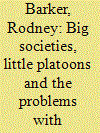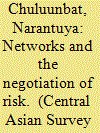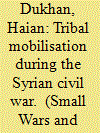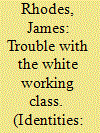|
|
|
Sort Order |
|
|
|
Items / Page
|
|
|
|
|
|
|
| Srl | Item |
| 1 |
ID:
103542


|
|
|
|
|
| Publication |
2011.
|
| Summary/Abstract |
Conservative talk of a 'big society' is one more mutation of the unstable family of pluralism. It is a large family, with both benign and progressive left wing members and rogue right wing black sheep. The progressive contribution has been substantial, but pluralism is not a homogeneous ideology or set of policies, and the single word conceals stresses and irreconcilable oppositions in theory and practice. An examination of this variety gives clues to the latest contributions, and to some of the more regressive uses to which pluralism can be put. The left needs both to insist on its own major contribution to progressive pluralism, and to beware of wolves in pluralist clothing.
|
|
|
|
|
|
|
|
|
|
|
|
|
|
|
|
| 2 |
ID:
169916


|
|
|
|
|
| Summary/Abstract |
Historians of terrorism note that modern terrorists rely almost exclusively on two weapon types: the gun and the bomb. However, the comparative use of these weapons differs from one terrorist group to the next. We exploit this variation to examine how the tactical decisions of terrorists respond to both strategic aspirations and resource constraints. We argue that a group’s goals (a strategic consideration) and size (a resource constraint) provide a parsimonious explanation for weapon selection. Because firearms inherently expose the shooter to higher risk, are more precise, and must be used if a group aspires to maintain social order, they are unlikely to be used by groups with limited recruits in a campaign of violence. We test this theory using data on over 350 terrorist organizations. Our analysis shows that strategic considerations and resource constraints both impact tactical choices, although groups with the most expansive goals, those which transcend national borders, as well as militias, are two interesting exceptions to our theory. Our research has implications for the use of disaggregated tactical data and in furthering our understanding of the rationality of terrorism.
|
|
|
|
|
|
|
|
|
|
|
|
|
|
|
|
| 3 |
ID:
160846


|
|
|
|
|
| Summary/Abstract |
This article identifies relationships that dominate small and medium businesses in Mongolia. Unlike other parts of Asia, these relationships are not necessarily hierarchical, nor are they purely market-driven. Rather, they are characterized by groups of people who sustain each other’s businesses and the social relations that hold them in place. In identifying such relations, we extend questions raised in the ‘economy of favours’ literature. If favours granted between known individuals are not simply about economic transactions, we ask, then what does this say about the kind of capitalist economy prevalent in Mongolia? Not simply an outcome of external forms of financialization, nor a remnant of the socialist planned economy, these relations open up the possibility for a range of ways of doing business in a climate that does not guarantee economic and social security in the sense that we may be familiar with. Attending to the way business deals and people are made and remade within networks and groups, capitalism is opened up to an economic diversity that shapes it from within.
|
|
|
|
|
|
|
|
|
|
|
|
|
|
|
|
| 4 |
ID:
188339


|
|
|
|
|
| Summary/Abstract |
As a result of the debilitating situation that the Syrian state reached during the Syrian Civil War, the government relies heavily on paramilitary groups to confront security challenges. Existing studies imply that all the paramilitary groups in Syria were formed in a largely top-down process. Focusing on the rise of al-Baqqer Brigade in Syria and relying on a series of in-depth interviews with members of the al-Baggara tribe who make up most of this militia, this paper challenges that assumption. The paper shows that the emergence of tribal militias is principally a grassroots phenomenon stemming from competition over local resources. It argues that the Syrian state has seized this opportunity and outsourced some of its security and counterinsurgency tasks to the group.
|
|
|
|
|
|
|
|
|
|
|
|
|
|
|
|
| 5 |
ID:
116582


|
|
|
|
|
| Publication |
2012.
|
| Summary/Abstract |
Over the course of the last two decades, 'whiteness' has exploded as an area of academic inquiry bringing together scholars from an array of academic disciplines and generating significant new insights that have contributed to a more complex understanding of a racialised positioning often taken for granted as a normative, unmarked, even invisible system of privilege. Within this field, the 'white working class' has come to assume an integral position. This category has offered an analytic object through which notions of enduring white privilege, white victimhood, multicultural politics and white racism have all been explored. While there are clear and striking political problems within all of these dominant accounts, this article instead focuses on a more foundational and related issue: that of the invocation of the 'white working class' itself.
|
|
|
|
|
|
|
|
|
|
|
|
|
|
|
|
|
|
|
|
|